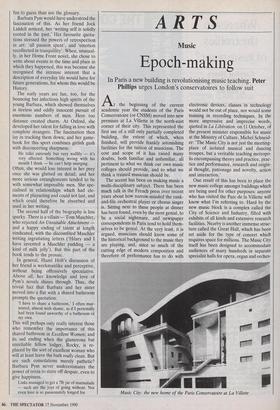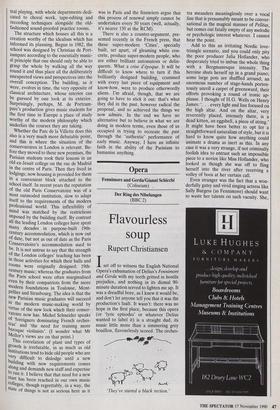ARTS
Music
Epoch-making
At the beginning of the current academic year the students of the Paris Conservatoire (or CNSM) moved into new premises at La Villette in the north-east corner of their city. This represented the first use of a still only partially completed building, the extent of which, when finished, will provide frankly astonishing facilities for the tuition of musicians. The cost and scope of it has raised many doubts, both familiar and unfamiliar, all pertinent to what we think our own music colleges should provide, and to what we think a trained musician should be.
The accent has been on making music a multi-disciplinary subject. There has been much talk in the French press over recent years about how narrow-minded the rank- and-file orchestral player or chorus singer is. Sitting next to these people at dinner has been found, even by the most genial, to be a social nightmare, and newspaper correspondents in Paris tend to hold them- selves to be genial. At the very least, it is argued, musicians should know some of the historical background to the music they are playing, and, since so much of the cutting edge of modern composition and therefore of performance has to do with electronic devices, classes in technology would not be out of place, nor would some training in recording techniques. In the more impressive and imprecise words, quoted in La Liberation on 11 October, of the present minister responsible for music at the Ministry of Culture, Michel Schneid- er: 'The Music City is not just the meeting- place of isolated musical and dancing troupes, but a veritable teaching metropo- lis encompassing theory and practice, prac- tice and performance, research and origin- al thought, patronage and novelty, action and interaction.'
One result of this has been to place the new music college amongst buildings which are being used for other purposes: anyone who has visited the Parc de la Villette will know what I'm referring to. Hard by the new music block is a complex called the City of Science and Industry, filled with exhibits of all kinds and extensive research facilities. Nearby is another immense struc- ture called the Great Hall, which has been set aside for the type of concert which requires space for millions. The Music City itself has been designed to accommodate audiences of many hundreds in separate specialist halls for opera, organ and orches- Music City: the new home of the Paris Conservatoire at La Villette tral playing, with whole departments dedi- cated to choral work, tape-editing and recording techniques alongside the old- fashioned sound-proofed practice rooms.
The structure which houses all this is a creation worthy of the idealism which has informed its planning. Begun in 1982, the school was designed by Christian de Port- zamparc according to the essentially music- al principle that one should only be able to grasp the whole by walking all the way round it and thus place all the deliberately unexpected views and perspectives into the overall conception. The building, as it were, evolves in time, the very opposite of classical architecture, whose interior can be guessed by one look at its exterior. Surprisingly, perhaps, M. de Portzam- parc's production gives music students for the first time in Europe a place of study worthy of the modern philosophy which underlies the courses they are taking.
Whether the Parc de la Villette does this also is a very much more debatable point, and this is where the situation of the conservatoires in London is relevant. Be- fore they moved to these new premises, the Parisian students took their lessons in an old ex-Jesuit college on the rue de Madrid in the centre of Paris. Then they lived in lodgings; now housing is provided for them in a convenient block attached to the school itself. In recent years the reputation of the old Paris Conservatoire was of a most outmoded institution, slow to adapt itself to the requirements of the modern professional world. This inflexibility of mind was matched by the restrictions imposed by the building itself. By contrast all the leading London colleges have spent many decades in purpose-built 19th- century accommodation, which is now out of date, but not as out of date as the Paris Conservatoire's accommodation used to be. It is not untrue to say that the strength Of the London colleges' teaching has been in those activities for which their halls and rooms were originally designed: 19th- century music; whereas the graduates from the Paris school were often marginalised even by their compatriots from the more modern foundations in Toulouse, Mont- pellier and Strasbourg. The idea is that the new Parisian music graduates will succeed in the modern music-making world by virtue of the new look which their conser- vatoire now has. Michel Schneider speaks of 'foreigners dominating French orches- tras' and 'the need for training more baroque violinists'. (I wonder what Mr Mellor's views are on that point.) This correlation of plant and types of growth is irrefutable, in as much as old institutions tend to hide old people who are Very difficult to dislodge until a new building with new requirements comes along and demands new staff and expertise to run it. I believe that that need for a new start has been reached in our own music Colleges, though regrettably, in a way, the state of things is not as serious here as it was in Paris and the financiers argue that this process of renewal simply cannot be undertaken every 50 years (well, actually, it's nearer 150 at the RCM).
There is also a counter-argument, pre- sented recently in the French press, that these super-modern 'Cities', specially built, set apart, of gleaming white con- crete, produce super-modern people, who are either brilliant automatons or delin- quents. What a crise d'epoque. It will be difficult to know where to turn if this brilliantly designed building, crammed with every last piece of equipment and know-how, were to produce otherwordly aliens. I'm afraid, though, that we are going to have to stick it out: that's what they did in the past, however radical the proposal, and so achieved the things we now admire. In the end we have no alternative but to believe in what we are doing in modern terms, even those of us occupied in trying to recreate the past through the 'authentic' performance of early music. Anyway, I have an infinite faith in the ability of the Parisians to humanise anything.
























































 Previous page
Previous page